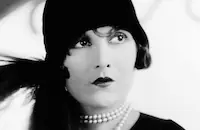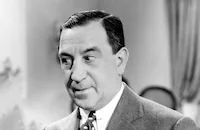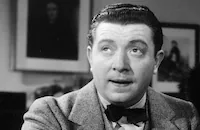Traveling Husbands

Brief Synopsis
Cast & Crew
Paul Sloane
Evelyn Brent
Frank Albertson
Constance Cummings
Hugh Herbert
Dorothy Peterson
Film Details
Technical Specs

Synopsis
When young salesman Barry Greene receives word that he has been assigned to the prestigious J. C. Wilson account in Detroit, he wires Wilson from his train and cockily informs him that he is about to be offered the "opportunity of a lifetime." While waiting to see Wilson, Barry meets Wilson's daughter Ellen and, unaware of her identity, forcefully delivers his sales pitch to her. Amused by Barry's sincerity, Ellen promises to "put in a good word" for him with her father. However, when confronted with her father's usual paternal neglect, she threatens to "turn wild" and leaves his office without saying a word about Barry. Tossed out of Wilson's waiting room, Barry accepts a ride from the dejected Ellen and makes a date with her for that night. When he learns that his expense account is being withheld until he secures Wilson's business, however, he writes Ellen a note from his hotel room excusing himself. Alone in the hotel restaurant, Ellen is approached by one of Barry's colleagues, Ben Hall, a notorious womanizer. Meanwhile, Barry's fellow salesmen--Hymie, Joe and Pinky--party in a suite with several prostitutes, including the hard-bitten Ruby Smith, who once was involved with Ben. After making the nightclub circuit, Ben returns to his hotel room with Ellen and tries to force himself on her. Barry, hearing Ellen's cries, rushes to Ben's room and struggles with him in the dark. During the fight, Ben is shot and seriously wounded, and Barry, the obvious suspect, is ordered by hotel detective Dan Murphy to stay in the rooms with the other partygoers. While the group waits to hear the outcome of Ben's surgery, Ben's wife Martha arrives. Faced with Martha's wifely selflessness, Ruby confesses her hopeless love for Ben and admits that she shot him out of jealousy. Martha forgives Ruby and, informed that Ben will live, goes to his side. Cleared, Barry leaves with Ellen and Wilson, who now realizes his love for his daughter.

Director
Paul Sloane
Cast

Evelyn Brent

Frank Albertson

Constance Cummings

Hugh Herbert

Dorothy Peterson

Gwen Lee

Frank Mchugh

Carl Miller
Stanley Fields
Rita Laroy
Lucille Williams
Purnell Pratt
Spencer Charters
Tom Francis
Crew
Myles Connolly
Charles Kerr
Lloyd Knetchel
William Lebaron
Archie F. Marshek
Humphrey Pearson
Humphrey Pearson
Clem Portman
Max Rée
Max Rée
Max Steiner
Max Steiner
Leo Tover

Film Details
Technical Specs

Articles
Traveling Husbands
She stars as the neglected daughter of a wealthy shop owner. Tired of being ignored by her father, she decides grab her father's attention by living the wild life. She hopes to score a hot date with traveling salesman Frank Albertson, but when daddy kicks him out without buying anything, Albertson doesn't have the money to take her clubbing. Instead, Cummings decides to treat herself to a nice dinner at the hotel where Albertson and a group of married salesmen, the eponymous traveling husbands, are staying. To evade a prostitute (Evelyn Brent) who's become infatuated with him, married salesman Carl Miller joins Cummings for dinner and a night on the town. But when he gets her back to the hotel, he reveals some less than honorable intentions. Can Cummings protect her virtue and get the man she really wants?
RKO Studios had originally announced Traveling Husbands as a vehicle for Mae Clarke. Though Cummings has the primary female role, she didn't get top billing. That honor went to Evelyn Brent, as the prostitute who makes the mistake of falling in love with Miller. Brent had been a big star in silent films, particularly as the romantic gangster's moll in Josef von Sternberg's Underworld (1927). Though her voice recorded fine, however, with the coming of sound her home studio, Paramount, threw her into a series of poor vehicles that diminished her popularity. By 1931 she was freelancing, and would soon sink into B movies and serials. She would make one more notable film appearance, as the one-armed Satanist in Mark Robson's The Seventh Victim (1943) for producer Val Lewton.
Traveling Husbands is also notable for the appearances of two actors who would soon join the Warner Bros. stock company, Hugh Herbert and Frank McHugh. Herbert was best remembered for his comic roles in films like Footlight Parade (1933) and Gold Diggers of 1935, though he would be more serious as the lecherous businessman in She Had to Say Yes (1933), with Loretta Young. McHugh played a wide array of mostly comic sidekicks to stars like James Cagney and Pat O'Brien in films like Here Comes the Navy (1934) and Boy Meets Girl (1938).
Another future Warner's stalwart, composer Max Steiner, also worked on the film. Although he had been composing stock music for movies for years, including music sent out to be played as accompaniment to silent films, Traveling Husbands was the first film in which he was credited as musical director. In addition to providing the background score, he wrote the song "There's a Sob in My Heart," with lyrics by screenwriter Humphrey Pearson. The theme would enter RKO's stock music library and serve as title music for their musical shorts for years.
Screenwriter Pearson had one of Hollywood's more curious deaths. In addition to writing such pre-Code pictures as Hot Stuff (1929), with Alice White, and Westward Passage (1932), with Ann Harding and Laurence Olivier, he scored a big success with the 1935 adaptation of Ruggles of Red Gap, starring Charles Laughton. After attending a wild party sin 1937, he returned home drunk and started waving a gun around. In her attempts to disarm him, his wife accidentally shot him, causing his death at the age of 43.
Traveling Husbands won only mixed reviews. While Photoplay praised the cast, other critics complained about the plot's melodramatic contrivances. Most of the acting notices went to Brent. Later fans have praised the party scene, depicted through a vivid montage, and Leo Tover's beautifully lit cinematography.
Director: Paul Sloane
Producer: William LeBaron
Screenplay: Humphrey Pearson
Cinematography: Leo Tover
Music: Max Steiner
Cast: Evelyn Brent (Ruby Smith), Frank Albertson (Barry Greene), Constance Cummings (Ellen Wilson), Hugh Herbert (Hymie Schwartz), Dorothy Peterson (Martha Hall), Gwen Lee (Mabel), Frank McHugh (Pinkie), Carl Miller (Ben Hall), Bill Elliott (Hotel Dining Room Guest)
By Frank Miller

Traveling Husbands
Quotes
Trivia
Notes
February 1931 Film Daily news items announced Mae Clarke as the film's feminine lead, and James Gleason as a featured player. Neither of these actors appeared in the final film, however. Exteriors were shot in Detroit by Lloyd Knetchel, according to Film Daily. Modern sources credit scenarist Humphrey Pearson with co-writing the film's song.














